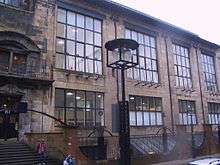Helen Biggar
Helen Biggar (25 May 1909 – 28 March 1953) was a Scottish sculptor, filmmaker and theatre designer. She was politically active in the 1930s, she joined the Communist Party of Great Britain and was one of the filmmakers behind Hell UnLtd, recognised as one of Britain's most important pieces of avant-garde political film.[1][2]

Helen Manson Biggar | |
|---|---|
| Born | 25 May 1909 Glasgow, Scotland |
| Died | 28 March 1953 (aged 43) St Mary Abbot's Hospital, London, England |
| Nationality | Scottish |
| Other names | Helen Montlake (married name) |
| Alma mater | Glasgow School of Art |
| Occupation | sculptor, theatre designer, political activist, film maker |
| Spouse(s) | Eli Montlake (1948 – her death) |
Life and education
Biggar was born in Glasgow, Scotland in 1909, the eldest daughter of Florence and Hugh Biggar, a founding member of the Independent Labour Party. She was the niece of John Biggar, Lord Provost of Glasgow between 1941 and 1943. As a child she fell victim to a number of accidents including two injuries to her spine, which affected her height.[3]
Biggar enrolled at the Glasgow School of Art in 1925, at the age of 16, to study textile design, and graduated in 1929. She then went on to study sculpture at postgraduate level.[4] Following her graduation, she set up a studio in the city.[3]
In 1945, Biggar moved to London, marrying Eli Montlake in 1948. She died at St Mary Abbot's Hospital, Paddington in London, having suffered a sudden brain haemorrhage,[4]
Artistic work
Sculpture
Biggar's sculptural work was undertaken in a variety of media including plaster, clay and stone. One focus of her work was portraiture, one of her subjects being Emilio Coia, a fellow student at Glasgow School of Art. Another subject was her sister Mary, and also her uncle John Biggar, the result of which was exhibited in 1935 at the Royal Glasgow Institute.[3]
Film
After leaving the Glasgow School of Art, Biggar met Norman McLaren, with whom she shared political views.[5] In 1935 they collaborated on Camera Makes Whoopee, an animated film made in plasticine. They then collaborated again in 1936 on Hell Unltd, a non-narrative protest film attacking government spending on munitions as opposed to healthcare and welfare provision. It was created though a collage by mixing animated sections, library footage and live-action.[6] Hell Unltd was bought and distributed by Kino Films.[3]
In March 1938, Biggar made a documentary concerning Glasgow's May Day Procession, entitled May Day 1938 or Challenge to Fascism.[5] The film was shot with three 16mm static cameras, manned by Biggar, her old tutor from Glasgow School of Art Willie Maclean and G. Bartlett of the Glasgow Kino Group. Biggar placed an advert in the Scottish Co-operative newspaper seeking assistance to raise £50 to make it.[7]
Theatre
Biggar joined the Glasgow Workers' Theatre Group in 1938, becoming their stage designer. After its founding in 1940, she designed for the Glasgow Unity Theatre, and in 1950, joined Ballet Rambert as a costume designer and wardrobe mistress.[3]
Legacy
Anna Shepherd, Biggar's niece, wrote two accounts of her life. The first, unpublished, work, Traces Left, served as the source material for a documentary made by the Birmingham Film Workshop in 1983.[4] In 2014 Shepherd published Helen Unlimited: A Little Biggar.[8]
References
- Archives, Glasgow School of Art; Collections. "Helen Biggar: Hell Unltd screening tonight at GFT". GSA Archives and Collections. Retrieved 5 March 2016.
- Biggar [married name Montlake], Helen Manson (1909–1953) -. Oxford Dictionary of National Biography. Oxford University Press. doi:10.1093/ref:odnb/54391.
- Modern Scottish Women: Painters and Sculptors 1885–1965. Edinburgh: National Galleries of Scotland. 2015. p. 34. ISBN 9781906270896.
- "Helen Biggar – Mapping the Practice and Profession of Sculpture in Britain and Ireland 1851–1951". sculpture.gla.ac.uk. Retrieved 5 March 2016.
- "Helen Biggar – Filmmaker Extraordinary". www.glasgowfilm.org. Archived from the original on 6 March 2016. Retrieved 5 March 2016.
- "Hell Unltd (1936)". BFI. Retrieved 5 March 2016.
- Brownrigg, Jenny; Main, Shona (1 May 2016). "Challenge to Fascism: Glasgow's May Day (1938)". Map. Retrieved 13 May 2016.
- Shepherd, Anna (1 January 2014). Helen Unlimited: A Little Biggar. ISBN 9780951841075.
External links
- Hell Unltd (1936) - BFI synopsis, with clips and production stills